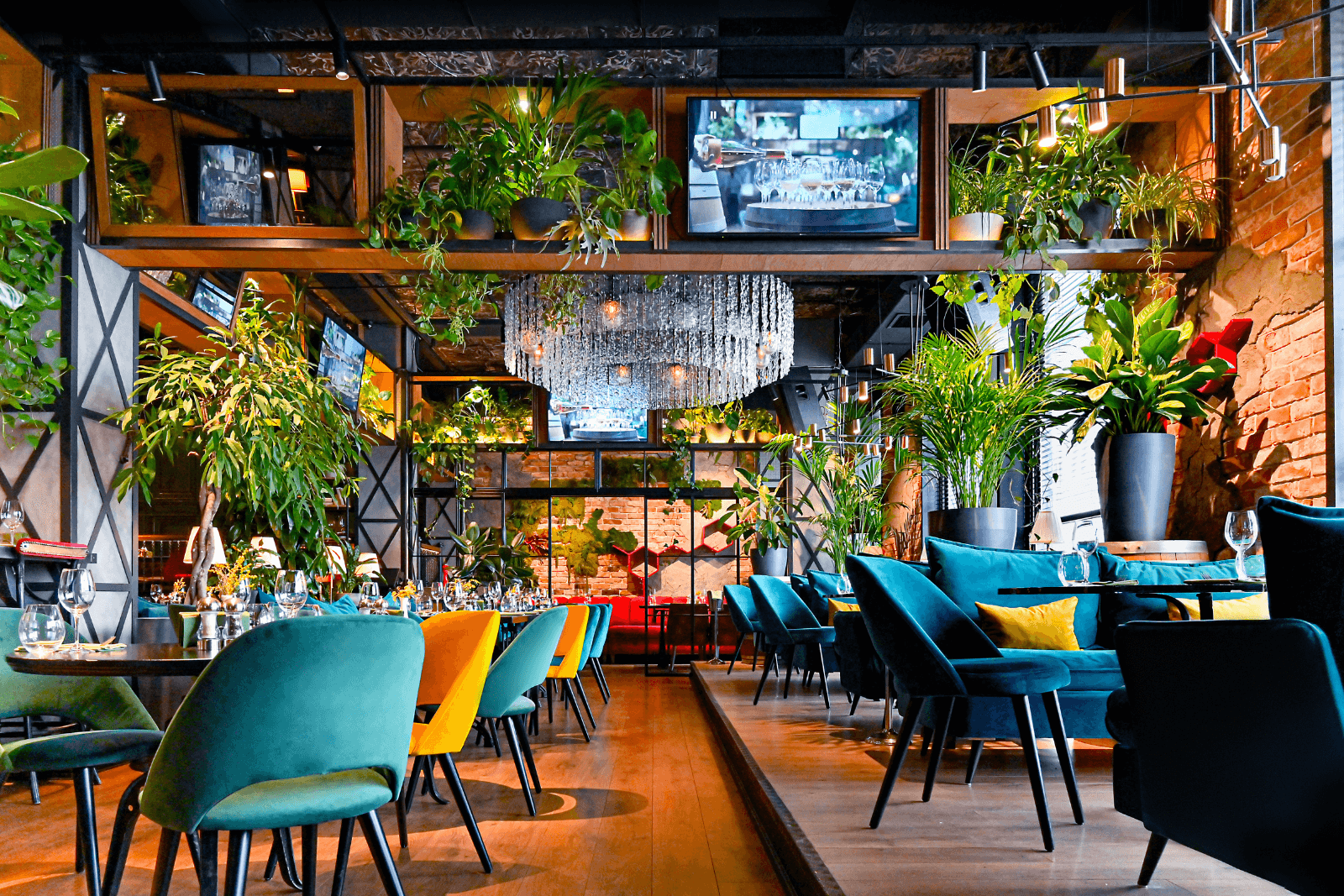If you’re an owner or manager of a restaurant that relies exclusively on walk-in guests or is still booking tables manually, it might be time to reconsider your approach.
More precisely, online restaurant reservation systems have become indispensable tools for ensuring smooth operations and delightful guest experiences.
From optimizing table management to boosting revenue, these platforms offer a myriad of benefits to both restaurant owners and diners alike.
In this article, we'll explore six key advantages of implementing a restaurant reservation system, shedding light on how this technology can enhance your establishment's operations and elevate your competitive edge.
Ensures a Better Guest Experience
The first benefit of introducing an online reservation system is straightforward: it ensures a better guest experience.
Needless to say, this is paramount for success in today’s competitive restaurant landscape.
By allowing guests to book tables in advance, you're demonstrating a commitment to their convenience and comfort, as they no longer have to endure long waits or uncertain availability.
This translates directly into happier customers who are more likely to return and spread positive word-of-mouth.
This is confirmed in a study done by Lunchbox.io, whose results are shown below:
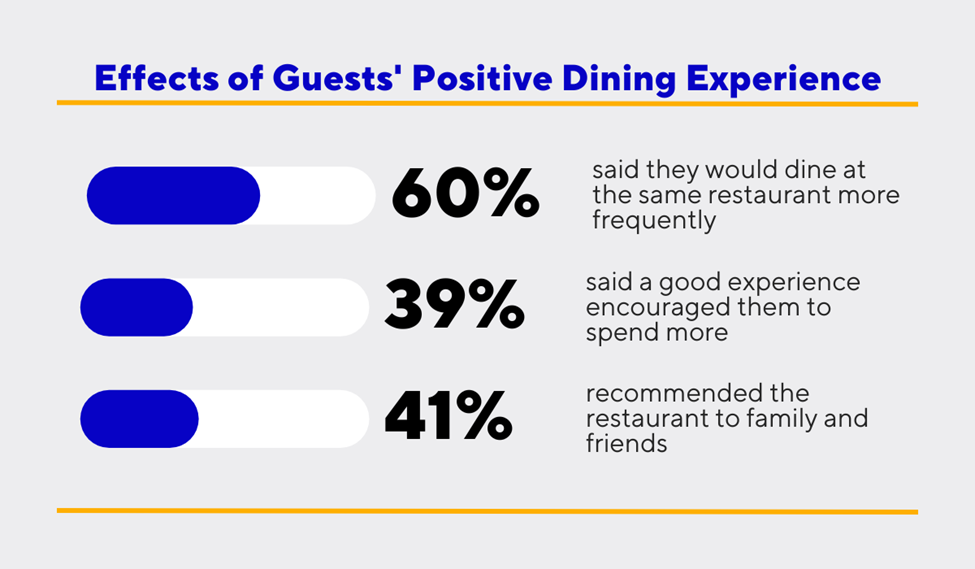
Illustration: Tablein / Data: Lunchbox.io
Another experience-boosting benefit of a restaurant reservation system is, naturally, reduced or eliminated wait times.
Simply put, guests can book tables at their preferred time and location without having to wait in line or call the restaurant, thus avoiding long wait times during peak hours, which leads to a more pleasant experience.
Moreover, with a reservation system in place, you can accurately manage seating arrangements, ensuring that tables are ready precisely when guests arrive.
This seamless experience sets a positive tone for the entire meal and leaves a lasting impression, which also motivates guests to write great online reviews.
As you can see below, this guest was celebrating their birthday and received a personalized service in the form of a cake.
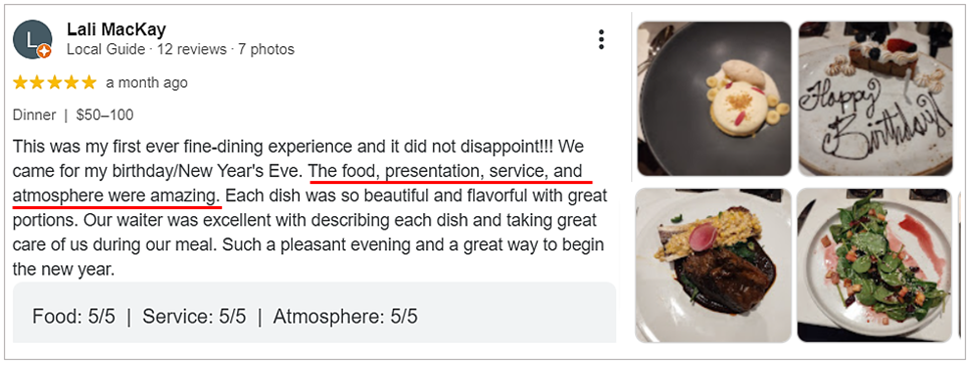
Source: Xochi on Google
This is another advantage of an online reservation system, where guests can easily list their preferences (special occasions, dietary restrictions, favorite seating arrangements), allowing restaurants to tailor service to their individual needs.
Moreover, it ensures that these personal preferences won’t be forgotten the next time a satisfied patron visits your establishment.
In other words, the software will remember all guests and store the details about them, from their names to specific requirements.
This means you can greet returning guests by name, offer them a complimentary dessert, or seat them at their preferred spot, enhancing their overall experience.
Overall, a restaurant reservation system paves the way for a smoother, more personalized, and ultimately more enjoyable dining experience, prompting guests to both return to your restaurant and recommend it to family and friends.
Enhances Operational Efficiency
Automating reservation management enhances your restaurant’s operational efficiency in a multitude of ways.
First and foremost, your staff no longer have to spend valuable time answering phone calls, responding to emails, and manually updating reservation books while handling walk-in guests, no-shows, and other everyday front-of-house situations.
Instead, they will be able to devote more attention to providing exceptional service to seated diners and ensuring a seamless experience for all guests.
In addition to these efficiency gains, an automated reservation system typically offers a range of features designed to streamline restaurant operations and maximize productivity.
For example, our online restaurant reservation system, Tablein, is an advanced, yet user-friendly tool that automates the management of all your reservations.
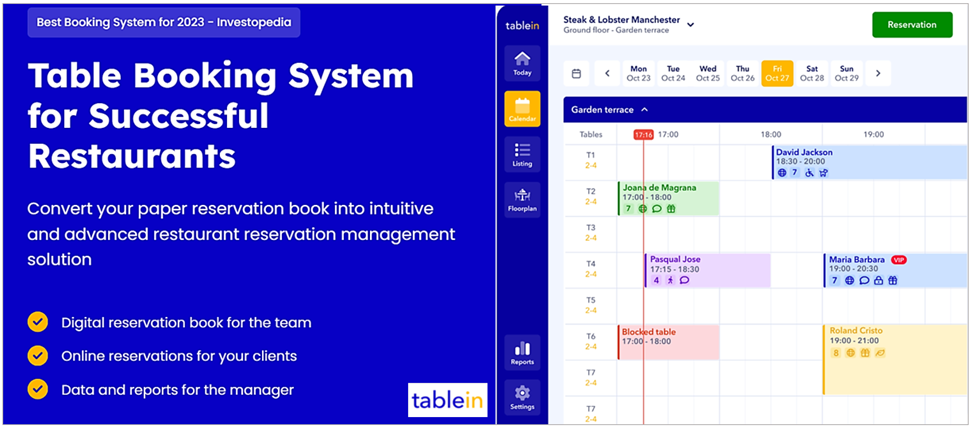
Source: Tablein
As shown, Tablein empowers your guests to easily make reservations at any time, whether you’re open or not, from their smartphones and other devices.
This streamlines the reservation process and reduces the workload on your staff, thus increasing operational efficiency.
Next, using Tablein's digital reservation book, your team can easily view and manage reservations in real time, reducing the risk of errors and ensuring no bookings are overlooked.
Likewise, you can utilize the full visibility of bookings to allocate staff more effectively.
For instance, if reservations show an unexpected rush of guests on a usually uneventful Wednesday, you can timely engage more staff to ensure optimal service levels during peak hours.
At the same time, you can optimize table turnover by openly communicating your table time limit in your booking policy, like in this example.
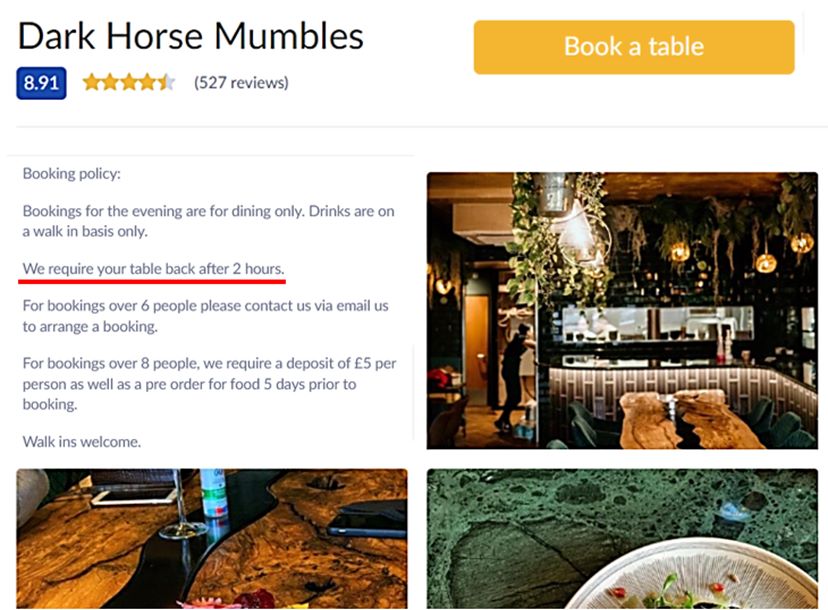
Source: Tablein
By setting clear expectations for guests, you can optimize seating capacity, serve more people, and increase your restaurant’s productivity.
Lastly, a good restaurant reservation system will provide valuable data and reports.
As discussed next, this enables better forecasting of demand, inventory, and staffing.
To recap, adopting an online reservation system enables you to automate, streamline, and improve many aspects of your restaurant’s operational efficiency, from seamless reservation management and minimized staff burden to maximized guest satisfaction.
Facilitates Better Forecasting
With access to reservation data and analytics, you can gain insights into booking trends, peak hours, and guest preferences, thereby enabling more informed decision-making and resource allocation.
This ability to forecast demand more accurately is invaluable for optimizing inventory levels, staffing schedules, and overall operational efficiency.
For instance, by analyzing historical reservation data, you can identify patterns and trends in guest behavior.
More specifically, you can determine which days and times typically have the most booked hours, which enables you to adjust staffing levels accordingly.
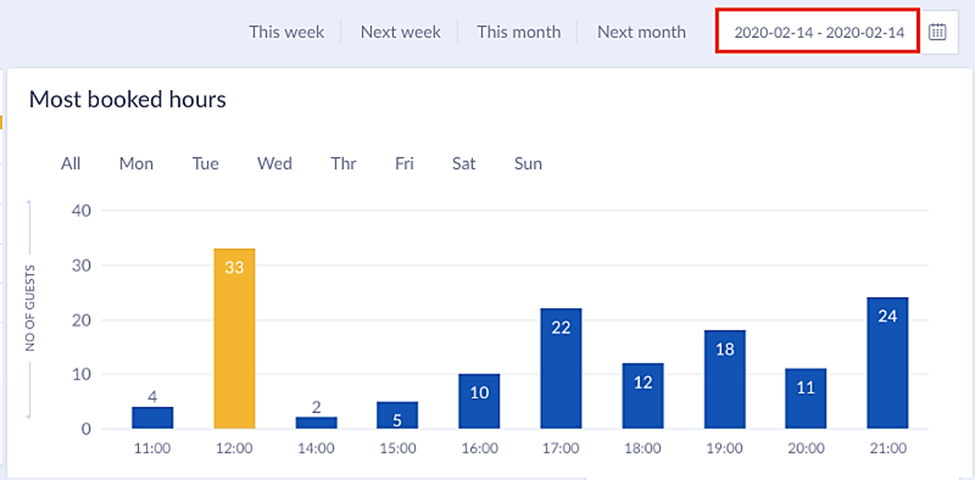
Source: Tablein
Based on these insights, you can ensure that enough hosts, waitstaff, and kitchen staff are on duty, thereby preventing employees from being overwhelmed and guests from having to wait longer and experience substandard service.
Equally, you can avoid overstaffing during slower periods revealed by your reservation system.
However, it's important to strike a balance between minimizing labor costs and maintaining sufficient staffing levels to handle walk-in guests and provide quality service.
Similarly, if a particular day of the week sees a surge in reservations for larger parties, you can ensure they have enough seating and staff available to accommodate these groups.
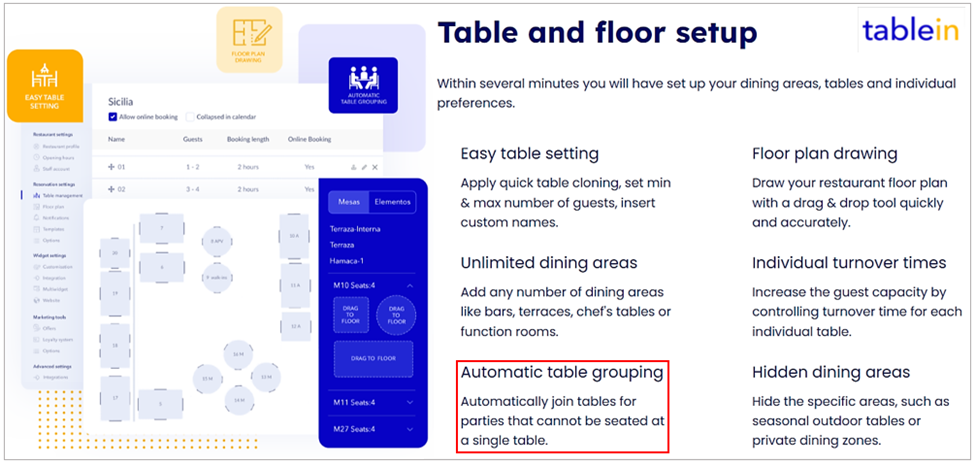
Source: Tablein
Furthermore, reservation data can provide valuable insights into guest preferences and dining habits.
For example, if a certain dish is consistently pre-ordered by your guests or receives rave reviews, your reservation system will record it.
Using data analytics and reporting features, you can more accurately predict which menu items will be in high demand on any given day and adjust your inventory purchasing decisions accordingly.
In summary, a restaurant reservation system facilitates better forecasting by providing access to valuable reservation data and analytics.
By leveraging this information, you can anticipate demand, optimize inventory and staffing levels, and ultimately improve operational efficiency and guest satisfaction.
Streamlines Front-of-House Operations
This next benefit of a reservation system largely overlaps with the two advantages we already covered, namely providing a better guest experience, and enhancing operational efficiency.
This is because reservation systems help streamline front-of-house operations by providing hosts and hostesses with a centralized platform for:
- managing bookings,
- optimizing seating arrangements, and
- accommodating guest preferences.
The result is more satisfied diners and improved staff productivity.
For example, front-of-house staff can minimize no-shows by instructing the system to send automatic email or SMS reminders to guests who made a reservation.
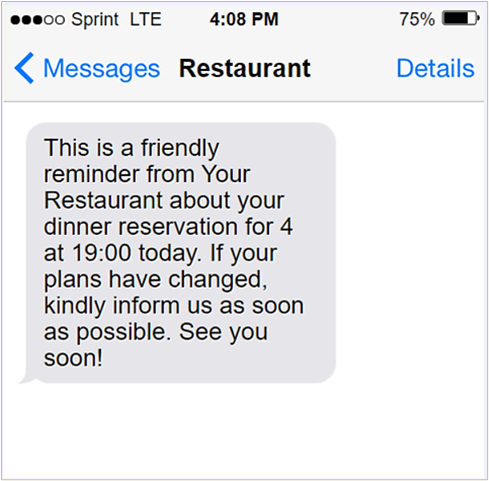
Source: Tablein
This feature can help avoid empty tables during peak times by allowing staff to instantly update table availability to accommodate walk-ins or waitlisted patrons.
Likewise, if a reservation is canceled or a guest arrives early, hosts can use the system to make on-the-go adjustments to table arrangements in line with the changed circumstances.
As mentioned, the reservation system also enables hosts to access important guest information, such as dietary preferences, special occasions, and any other requirements.
Armed with this knowledge, hosts can proactively make arrangements to meet these needs, enhancing guest satisfaction.
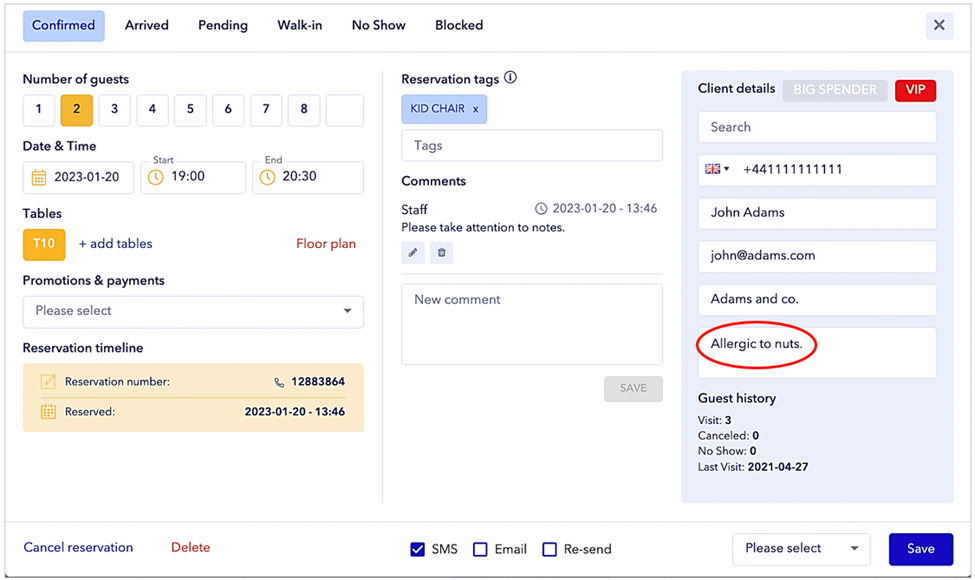
Source: Tablein
As illustrated, the reservation system’s comments and notes section will store guest preferences and special requests, allowing hosts to communicate this information effectively to servers and kitchen staff.
This improved communication fosters coordination between front-of-house and back-of-house staff, thereby avoiding errors and facilitating smooth service delivery.
All in all, a reservation system streamlines front-of-house operations by allowing hosts to easily manage bookings and other guest requirements, helping them to effectively communicate with other staff, optimize table utilization, and enhance guest satisfaction.
Increases Revenue
A restaurant reservation system can be a powerful tool for increasing revenue by optimizing various aspects of the dining experience and leveraging guest data for targeted marketing efforts.
As we explained earlier, restaurants can utilize the system to forecast demand more accurately and maximize table turnover by efficiently managing bookings and seating arrangements.
For example, by strategically spacing out reservations and minimizing downtime between parties, restaurants can serve more guests without compromising service quality, ultimately driving higher revenue per available seat.
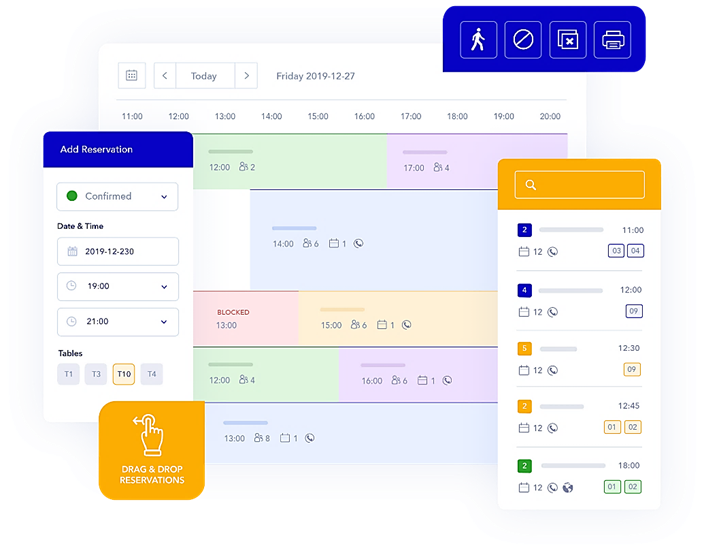
Source: Tablein
Another way a reservation system can boost your restaurant’s revenues is by allowing guests to make table bookings through various channels, such as your website, social media like Facebook and Instagram, and Google Maps.
That way, by enhancing booking convenience, you can get more reservations and serve more guests, thereby increasing revenue.
This is highlighted by the fact that 79% of prospective diners will check a restaurant's website or social media pages before making a reservation, while around 80% of them will use search engines to discover new restaurants.
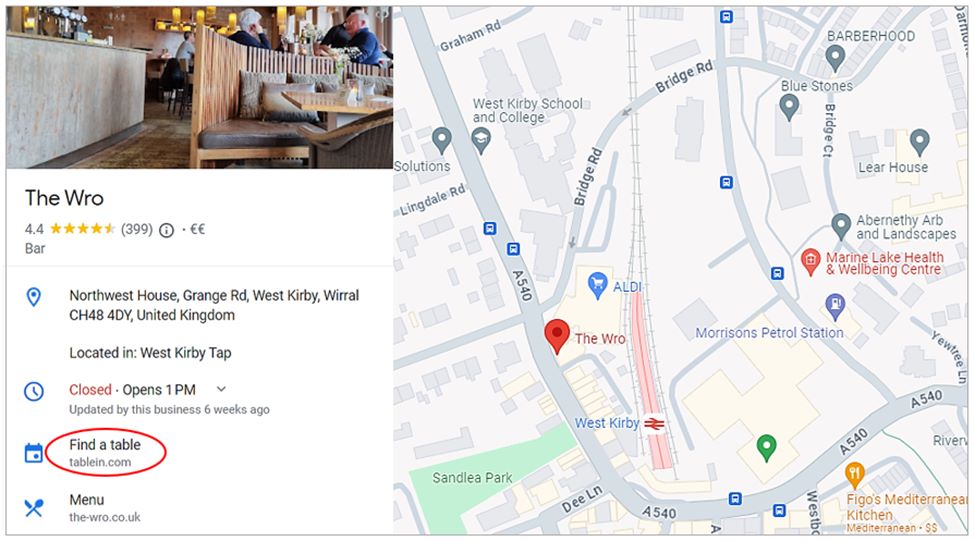
Source: The Wro on Google Maps
Moreover, since the reservation system collects valuable guest data, it can be used to create targeted marketing campaigns and promotions.
By analyzing reservation history, dining preferences, and demographic information, your team can identify opportunities to upsell, cross-sell, and promote special offers to specific customer segments.
For instance, you can leverage the system’s data to send personalized emails or offers to guests celebrating birthdays or anniversaries, enticing them to return and spend more, thereby driving revenue.
In summary, a reservation system enables restaurants to boost their revenue by maximizing table utilization, providing ultimate booking convenience, and executing targeted marketing strategies.
Creates a Competitive Advantage
A streamlined reservation process and a better overall dining experience can help your restaurant stand out in a crowded market, attract new customers, and foster loyalty among existing patrons.
Combined, all these benefits of a reservation system help you create a competitive advantage for your restaurant.
For instance, offering online reservations through your website and social media channels allows potential customers to easily discover and book a table at your restaurant, giving you an edge over establishments that rely solely on walk-in traffic.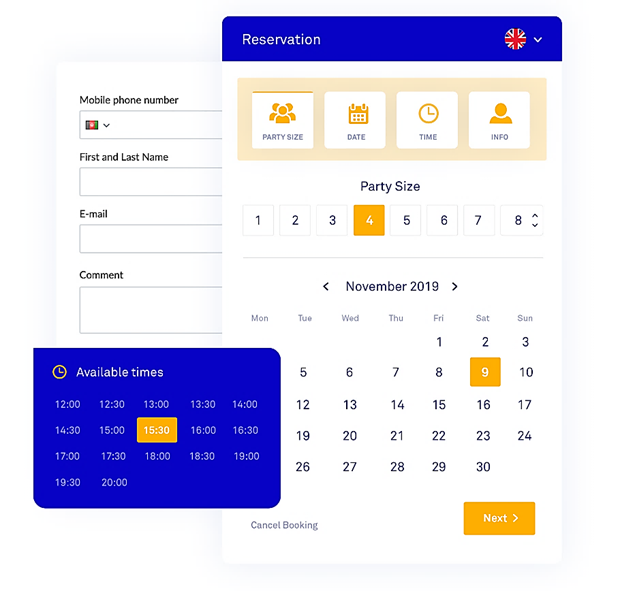
Source: Tablein
Additionally, features like real-time availability updates and instant confirmation emails enhance your guests’ booking experience, further setting your restaurant apart from competitors.
Moreover, a user-friendly online reservation system caters to new, tech-savvy generations of guests who expect modern amenities and seamless digital experiences when dining out.
By offering online booking options, mobile-friendly interfaces, and integration with popular platforms like Google Maps and social media, your reservation system can effectively address those needs.
For instance, by enabling customers to make reservations directly from their smartphones or social media accounts, your restaurant appeals to tech-savvy diners who value convenience and efficiency.
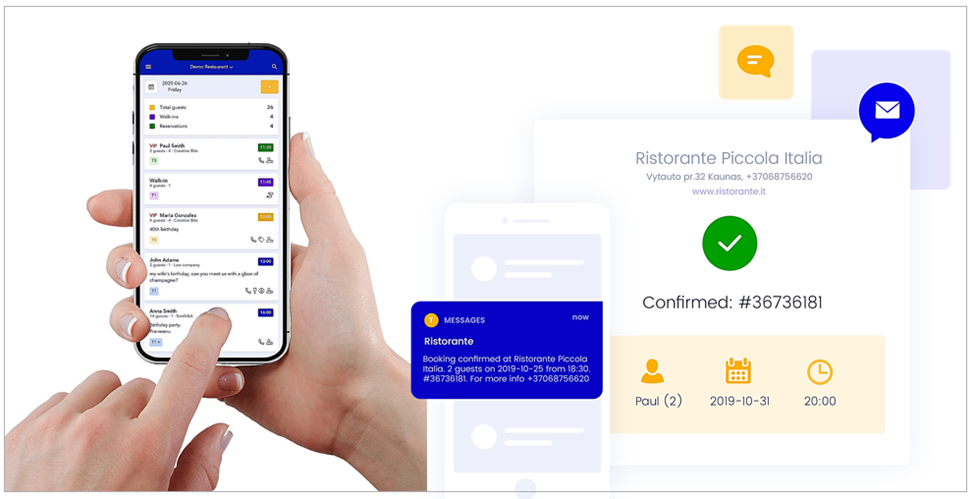
Source: Tablein
Furthermore, as we already discussed, a reservation system enables you to personalize the dining experience for guests, thereby enhancing customer satisfaction and loyalty.
This personalized approach fosters a deeper connection with your guests, making them more likely to return and recommend your restaurant to others.
So, a reservation system equips your restaurant with the tools and capabilities needed to offer a superior dining experience, attract new customers, and build long-term loyalty.
By leveraging these benefits, you can differentiate your restaurant in a competitive market and position it for long-term success.
Conclusion
Given the key benefits described in this article, it’s clear that having a restaurant reservation system can significantly enhance the efficiency, profitability, and competitiveness of your establishment.
This starts by the system ensuring a better guest experience through seamless reservation management and enhanced efficiency of front- and back-of-house operations.
Next, automated data collection and analysis enables easier demand forecasting and provides insights into efficiency gains and opportunities for increasing revenue streams and maintaining a competitive edge.
Ultimately, having an easy-to-use and affordable online reservation system is, in today’s world, a strategic necessity for restaurants seeking to optimize operations, maximize revenue, and adapt to evolving customer expectations.
Get a 30-day Exclusive Trial
As a Tablein blog reader, you’re eligible for an exclusive 30-day free trial to experience our simple reservation solution for your restaurant.
Enter your business email, and we’ll send you all the steps needed to create your account.
Share this
You may also like

Top 7 Features a Restaurant Reservation Software Needs to Have

7 Features to Look for In a Restaurant Reservation System
